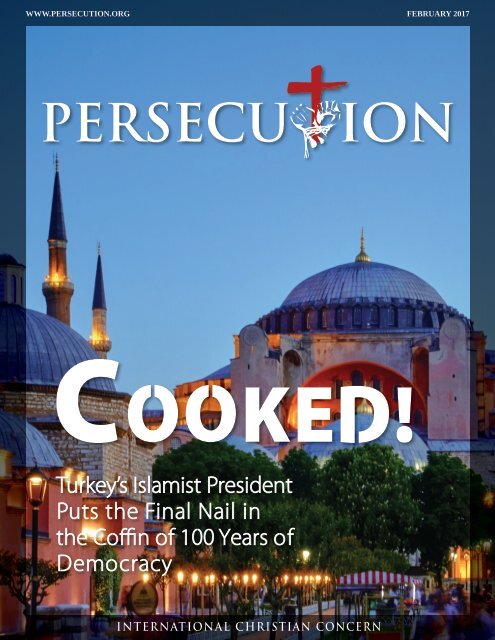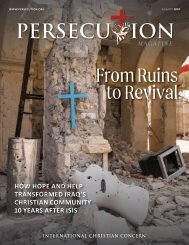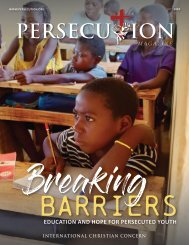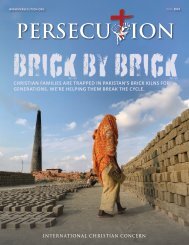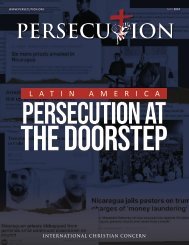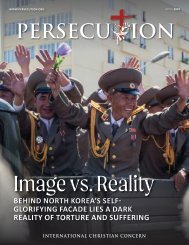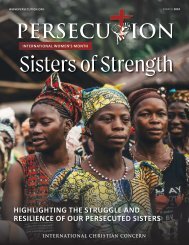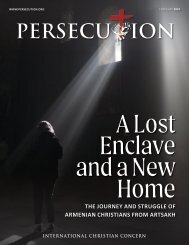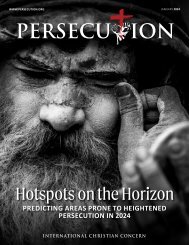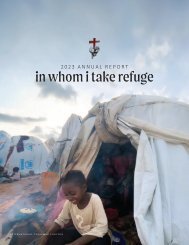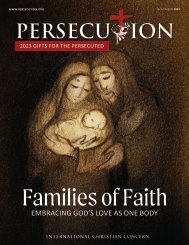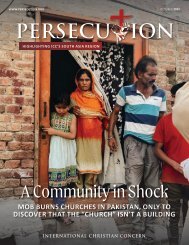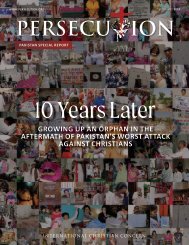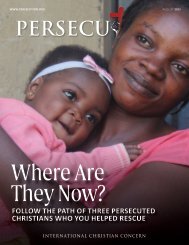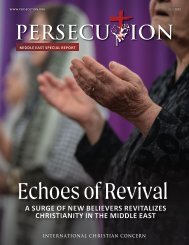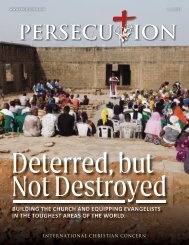Create successful ePaper yourself
Turn your PDF publications into a flip-book with our unique Google optimized e-Paper software.
WWW.PERSECUTION.ORG<br />
FEBRUARY <strong>2017</strong><br />
PERSECU ION<br />
COOKED!<br />
Turkey’s Islamist President<br />
Puts the Final Nail in<br />
the C<strong>of</strong>fin <strong>of</strong> 100 Years <strong>of</strong><br />
Democracy<br />
PERSECU ION.org<br />
INTERNATIONAL CHRISTIAN CONCERN
THE FULANI<br />
PLAGUE<br />
When the Fulani attacks first began, many saw<br />
them as farming and herding disputes between<br />
neighbors, but as their armory increases and<br />
their attacks grow in number, the narrative is<br />
shifting to one <strong>of</strong> jihad and religious targeting.<br />
By Sandra Elliot<br />
Fulani nomads herd their<br />
flock through the brush in<br />
central Nigeria. Though not<br />
all Fulanis are part <strong>of</strong> militias,<br />
as attacks on Christian<br />
farming villages continue<br />
and raiding parties gain<br />
better arms, the death toll<br />
continues to grow. Flickr<br />
Creative Commons image<br />
by user Rita Willaert.<br />
2 PERSECU ION.org<br />
FEBRUARY <strong>2017</strong><br />
INTERNATIONAL CHRISTIAN CONCERN
NIGERIA<br />
GTI RANK 3<br />
GTI SCORE 9.213<br />
ATTACKS BY TARGET<br />
Private citizens & property<br />
Military, militia or terrorist groups<br />
Religious<br />
Business<br />
Other<br />
DEATHS BY GROUP<br />
Boko Haram<br />
Unknown<br />
Fulani militants<br />
Other<br />
In 2014 Nigeria experienced the biggest yearly deterioration in<br />
terrorism on record. There were 5,662 more people killed from<br />
terrorism in 2014 than in 2013, an increase <strong>of</strong> almost 300 per cent.<br />
This is largely due to the increasing ruthlessness <strong>of</strong> Boko Haram,<br />
an Islamist terrorist group based in north-east Nigeria.<br />
Boko Haram was the world’s deadliest terrorist group in 2014<br />
killing 6,118 people in Nigeria through terrorist attacks. In 2013<br />
Boko Haram had killed 1,595 people. Despite this very large<br />
increase in deaths, the proportion <strong>of</strong> the total deaths that Boko<br />
Haram was responsible for fell slightly. In 2013 Boko Haram was<br />
responsible for 86 per cent <strong>of</strong> deaths in Nigeria, whereas in 2014<br />
they were responsible for 81 per cent.<br />
The reason for this change is the Fulani militants who killed 1,229<br />
people in 2014, up from 63 in 2013. They now pose a serious threat<br />
to stability. There has been an ongoing conflict over access and<br />
control <strong>of</strong> land between the semi-nomadic Fulani herdsmen and<br />
farmers in north-eastern Nigeria. There have been reports <strong>of</strong> a link<br />
between Boko Haram and Fulani militants, 63 particularly in regards<br />
to smuggling and organised crime. However, unlike Boko Haram<br />
who are now affiliated with ISIL and align with Deaths<br />
the establishment<br />
<strong>of</strong> a caliphate, the Fulani militants have very localised goals,<br />
mainly greater access to grazing lands for livestock.<br />
In Nigeria private citizens are overwhelmingly targeted, most <strong>of</strong>ten<br />
with firearms resulting in very high levels <strong>of</strong> deaths per attack. In<br />
2014 Boko Fulani Haram killed militants on average 15 people were per responsible<br />
attack whereas<br />
Fulani militants killed eight per attack.<br />
INCIDENTS<br />
662<br />
DEAD<br />
INCREASE IN DEATHS SINCE 2000<br />
2000<br />
7,512<br />
MAJOR ATTACK<br />
PROPERTY<br />
DAMAGE<br />
1,512<br />
INJURED<br />
7,512<br />
Most terrorist attacks were in the northeast <strong>of</strong> Nigeria where<br />
Boko Haram is based, with 40 per cent <strong>of</strong> attacks in their home<br />
state <strong>of</strong> Borno. The most attacks were seen in Maiduguri, the<br />
regional capital <strong>of</strong> Borno State, and Kano in northern Nigeria<br />
which is the second largest city in Nigeria. There were 146<br />
cities that had at least ten people killed from terrorist attacks<br />
in 2014 and 19 cities that had at least 100 people killed. The<br />
two areas with the most deaths from terrorism were Konduga<br />
with 444 and Maiduguri with 431 deaths. Konduga is a<br />
community in Borno State with a population <strong>of</strong> less than<br />
20,000. Konduga served as a minor base for Boko Haram<br />
members which led to government forces clashing with Boko<br />
Haram members in early 2015.<br />
The nature <strong>of</strong> terrorism in Nigeria is different to Iraq and<br />
Afghanistan. Terrorist activity in Nigeria has more in<br />
common with the tactics <strong>of</strong> organised crime and gangs,<br />
focusing more on armed assaults using firearms and knives<br />
than on the bombings <strong>of</strong> other 1,229<br />
large terrorist groups.<br />
Firearms were used in over half <strong>of</strong> all attacks in Nigeria and<br />
were responsible for 67 per cent Deaths<br />
<strong>of</strong> all deaths by Boko Haram<br />
and 92 per cent <strong>of</strong> deaths from Fulani militants.<br />
Whilst previously the use <strong>of</strong> suicide attacks by Boko Haram was<br />
rare, in 2014 they were responsible for 31 suicide attacks with an<br />
average <strong>of</strong> nearly 15 deaths per attack. The majority <strong>of</strong> these<br />
Fulani attacks were militants against private were citizens responsible<br />
and education and religious<br />
institutions. No other group in conducted suicide attacks<br />
for 1229 deaths in Nigeria in 2014.<br />
in 2014.<br />
GLOBAL TERRORISM INDEX 2015 | Results<br />
*Data gathered from Global Terrorism Index, 2015, p. 22, 43-44<br />
PERSECU ION.org<br />
INTERNATIONAL CHRISTIAN CONCERN<br />
2014<br />
2,246<br />
+7,492<br />
WORST ATTACK<br />
An attack at a mosque killed 122<br />
people and injured 270 when Boko<br />
Haram set <strong>of</strong>f explosives and shot at<br />
worshippers fleeing.<br />
Nigeria spread in the Institute for Economics & Peace’s 2015 Global Terrorism<br />
Index Report, page 22. Nigeria experienced a sharp increase in terror-related<br />
deaths and an extremely high rate <strong>of</strong> targeting civilians in 2014.<br />
Focus on Fulani Militants *<br />
In 2013: In 2014:<br />
for 63 deaths in Nigeria in 2013.<br />
= 25 People<br />
That is almost a 2000% increase<br />
92% Civilian Attacks<br />
81% Civilian Deaths<br />
In 2014, Fulani militants overwhelmingly targeted private civilians<br />
and not security forces. Civilian targets accounted for 92 percent <strong>of</strong><br />
Fulani attacks and 81 percent <strong>of</strong> Fulani victims – one <strong>of</strong> the highest<br />
civilian target rates by any terror group in the world.<br />
The annual cycle <strong>of</strong> a<br />
family farm has been<br />
the same for millennia<br />
and is the same the<br />
world over; plant and<br />
plow, reap and sow.<br />
Nigeria’s Christian<br />
farmers formerly lived<br />
under the simple discipline<br />
<strong>of</strong> this annual<br />
cycle until 15 years ago when they started to<br />
regularly face the storms <strong>of</strong> attacks by Fulani<br />
Islamist militias that are attempting to cleanse<br />
the land <strong>of</strong> Christians by burning their crops<br />
and homes and slaughtering their families.<br />
“They came upon us suddenly,” a survivor<br />
told ICC, “I struggled with the attackers to<br />
escape from my house. I was fleeing with my<br />
children when the bullets hit me.”<br />
When Fulani militants raid a village, they<br />
usually do so at night, armed with machetes<br />
and heavy firearms, murdering anyone in their<br />
path and leaving whole towns ablaze.<br />
The Fulani militants are a Muslim tribe that<br />
spans several African countries. They are a nomadic<br />
people who go wherever their cattle can find<br />
feeding grounds, too <strong>of</strong>ten on Christian farms.<br />
While Boko Haram grabs most <strong>of</strong> the<br />
headlines in Nigeria, the Fulani were killing<br />
Christians there for years before the existence<br />
<strong>of</strong> Boko Haram. What is staggering is the<br />
growth in deaths attributed to Fulani attacks<br />
– from 63 people in 2013 to 1,229 in 2014<br />
(Global Terrorism Index, 2015, p. 44).<br />
The maddening part about the massive<br />
number <strong>of</strong> attacks and deaths is that few outside<br />
<strong>of</strong> Nigeria are even aware <strong>of</strong> the scale<br />
<strong>of</strong> what’s happening. Even worse is the fact<br />
that Nigeria hasn’t made serious headway in<br />
protecting the Christian victims from Fulani<br />
militant attacks.<br />
Unfortunately, Nigeria’s armed forces are<br />
controlled by Muslims and the government is<br />
riddled with those protecting and even abetting<br />
these terrorist groups.<br />
22<br />
<strong>February</strong> 21-24, 2016<br />
In <strong>February</strong> <strong>of</strong> 2016, the Fulanis attacked<br />
10 villages in Benue state, killing over 500.<br />
The United Nation’s High Commissioner in<br />
Nigeria, Angele Dikongue Atangana, said<br />
at the time that it was the most destructive<br />
attack she had seen in her more than 20 years<br />
<strong>of</strong> experience.<br />
Carrying their trademark AK-47 rifles, the<br />
militants invaded the villages and farming<br />
settlements, gunning down children, women,<br />
men and elderly alike.<br />
When aid groups and journalists arrived<br />
on the scene, corpses littered the roads in<br />
various stages <strong>of</strong> decomposition as the killings<br />
3
Feature Article<br />
Predominately Christian<br />
farming communities in<br />
the Middle Belt <strong>of</strong> Nigeria<br />
remain in constant fear <strong>of</strong><br />
Fulani militias raiding and<br />
killing in their villages. Flickr<br />
Creative Commons image by<br />
user Conflict & Development<br />
at Texas A&M.<br />
occurred at different times. After the assault,<br />
when relatives <strong>of</strong> the deceased returned for<br />
the bodies <strong>of</strong> their loved ones, they were <strong>of</strong>ten<br />
ambushed and likewise slaughtered by the<br />
Fulani militants.<br />
Aside from the sheer magnitude <strong>of</strong> the attack,<br />
the Benue massacre marked a turning point<br />
for Fulani militant aggression. While previous<br />
attacks by Fulanis were confined to the Middle<br />
Belt regions <strong>of</strong> Nigeria, Benue is a southern<br />
state. This was the first time that the terrorists<br />
showed territorial expansion past central Nigeria.<br />
Reverend Yunusa Nmadu, chairman <strong>of</strong> the<br />
Kaduna Central District Church Council, told<br />
ICC that they have seen a significant increase<br />
in attacks from Fulani militants in 2016.<br />
“In previous years, it was an average <strong>of</strong> [one]<br />
attack in four months,” he said. “This year it has<br />
become two attacks per week average.”<br />
October 15, 2016<br />
“It came to us like it was the end <strong>of</strong> life,”<br />
Jummai Awuje, 65, told ICC, “The attackers<br />
came upon us suddenly so we fled for our lives<br />
carrying nothing…my husband was killed, his<br />
brother who was our breadwinner was also<br />
killed in the attack.”<br />
Awuje escaped with her children and grandchildren,<br />
running more than two kilometers<br />
to the nearest hospital. They have nothing left<br />
but the clothes on their back. Awuje was one<br />
<strong>of</strong> the more fortunate survivors <strong>of</strong> the October<br />
“We fled for our<br />
lives carrying<br />
nothing…my<br />
husband was killed,<br />
his brother who was<br />
our breadwinner<br />
was also killed.”<br />
– JUMMAI AWUJE, FULANI AT-<br />
TACK SURVIVOR<br />
15 attack in Godogodo, Nigeria.<br />
By the end <strong>of</strong> the assault, 40 Christians<br />
had died. It took days before the dead could<br />
be buried, as the Fulani militants stayed to<br />
occupy farms and loot crops.<br />
The attack in Godogodo was strategically<br />
planned and timed. According to some in the<br />
village, Muslim villagers conveniently left<br />
their homes a day before the attack.<br />
“There are Muslims and Fulanis in<br />
Godogodo, but we discovered that they had<br />
secretly informed them to move out ahead <strong>of</strong><br />
the attack,” one survivor told ICC.<br />
Thousands were displaced following the<br />
attack and are now living as internally displaced<br />
people in their own country.<br />
“My very pressing need is survival—food<br />
for my family,” a survivor told ICC, “We<br />
Christians are all scattered in different places.”<br />
October 27, 2016<br />
Two weeks after the Godogodo massacre,<br />
Fulani militants killed another seven<br />
Christians in four different villages. Pasakori,<br />
Mile One, Misisi, and Tudn-Wadea in Kaduna<br />
state were all attacked.<br />
Southern Kaduna once maintained a longstanding<br />
peace with the Fulani tribes, leading<br />
many to wonder why such historical peace<br />
should be disturbed for no apparent reason.<br />
“The sudden turn <strong>of</strong> events where herdsmen<br />
have taken up arms against their host communities<br />
is giving us a serious cause for concern,”<br />
read a statement from the Kaduna state elders<br />
after the attack.<br />
November 13, 2016<br />
Within days, Fulani militants numbering<br />
around 200 attacked four more villages in the<br />
Kauru local area <strong>of</strong> Nigeria’s Kaduna state.<br />
This time, 34 villagers were butchered, some<br />
beyond recognition.<br />
“We did mass burials today in two locations,”<br />
an <strong>of</strong>ficial <strong>of</strong> the Chawai Community<br />
Development Association told ICC at the time.<br />
“The attackers came over the hills, first in two<br />
4 PERSECU ION.org<br />
FEBRUARY <strong>2017</strong><br />
INTERNATIONAL CHRISTIAN CONCERN
Sokoto<br />
Kebbi<br />
Zamfara<br />
Katsina<br />
Kano<br />
Jigawa<br />
Yobe<br />
Borno<br />
Oyo<br />
Ogun<br />
Lagos<br />
Niger<br />
Kwara<br />
Ekiti<br />
Osun<br />
Ondo<br />
Edo<br />
Delta<br />
Abuja<br />
Kogi<br />
Kaduna<br />
Nasarawa<br />
Benue<br />
Enugu<br />
Ebonyi<br />
Anambra<br />
Cross<br />
River<br />
Abia<br />
Imo<br />
Bauchi<br />
Plateau<br />
Taraba<br />
Gombe<br />
Adamawa<br />
Nigeria<br />
Middle Belt region<br />
Bayelsa<br />
Rivers<br />
Akwa<br />
Ibom<br />
Area <strong>of</strong> particular concern<br />
States with major Fulani massacres<br />
in 2016<br />
groups, then converging into one, firing gun<br />
shots and moving in on the cluster <strong>of</strong> villages.”<br />
The Southern Kaduna People’s Union,<br />
speaking on behalf <strong>of</strong> the people, urged the<br />
Nigerian government to protect its citizens<br />
from such butchery. One <strong>of</strong> the mass graves<br />
held three generations <strong>of</strong> one family.<br />
“It is now abundantly clear to even the worst<br />
skeptics that southern Kaduna has become a<br />
killing field, where genocide is taking place<br />
unabated,” they wrote in a press statement.<br />
A Narrative Shift<br />
The Fulani militant incursion has brought a<br />
new level <strong>of</strong> devastation to Christians living in<br />
the Middle Belt <strong>of</strong> Nigeria. These blitzkrieg massacres<br />
wipe out entire communities at a time and<br />
create a manner <strong>of</strong> religious war in the country.<br />
When the Fulani attacks first began, many<br />
saw them as farming and herding disputes<br />
between neighbors. But as their armory<br />
increases and their attacks grow in number,<br />
the narrative is shifting to one <strong>of</strong> jihad and<br />
religious targeting.<br />
PERSECU ION.org<br />
INTERNATIONAL CHRISTIAN CONCERN<br />
“This is an aggressive attack on peaceloving,<br />
innocent natives,” Reverend Yunusa<br />
Nmadu told ICC. “We hear that they appeal to<br />
other Fulanis in other countries to come help<br />
them persecute and ethnically cleanse and<br />
fight to occupy.”<br />
The jihadi narrative also comes from the obvious<br />
connection between Boko Haram and the<br />
Fulani terrorists. Where else could poor nomadic<br />
herdsmen acquire military weapons and ammunition<br />
on a large scale other than from the existing<br />
terrorist network in Nigeria and elsewhere.<br />
The difference is in their ambitions.<br />
Boko Haram has political objectives and<br />
works to indoctrinate fellow Nigerians to join<br />
their cause via terrorism and territorial expansion.<br />
Fulani militants are not aiming to indoctrinate<br />
since they kill every man, woman and<br />
child they encounter. Their actions are more<br />
genocidal than oppressive.<br />
Call to Prayer<br />
The Nigerian Christian community in the<br />
middle <strong>of</strong> the country is in massive pain. We<br />
spoke with survivors <strong>of</strong> the recent attacks and<br />
gathered prayer requests from them. We ask<br />
you to pray and care for these brothers and<br />
sisters in Nigeria.<br />
“Pray that God will grant us peace in our<br />
homeland so that we can return. Some are<br />
heartbroken and need consolation and encouragement.”<br />
–Rhoda, mother<br />
“That God will help us to forgive the<br />
attackers, and open doors for us to find help<br />
and the means to take [care] <strong>of</strong> our families.”<br />
–Bulus, father<br />
“Pray for us that our hearts will be<br />
calmed down so that we can forgive. Pray<br />
that God will restore us back to our homes<br />
and help us to return to normal life and survive.”<br />
–Elisabatu, grandmother<br />
“That God will grant us peace, restore us to<br />
our homes and keep away this kind <strong>of</strong> evil from<br />
happening again.” –Jummai, grandmother<br />
“Pray for the pool <strong>of</strong> orphans that are being<br />
created for us as a result <strong>of</strong> the attacks. We<br />
don’t know what to do. That God will provide<br />
for the Church so as to help victims.”<br />
–Reverend Yanusa Nmadu.<br />
5
Feature Article<br />
From Mourning to Joy:<br />
Chibok Girls Restored to<br />
Their Families<br />
By Ashley Shay<br />
Imagine the anguish you would<br />
feel, agonizing over whether or<br />
not you would ever hold your kidnapped<br />
daughter in your arms again.<br />
Hundreds <strong>of</strong> parents experienced<br />
this unimaginable pain on April 14,<br />
2014, when their daughters were<br />
abducted by militant jihadists. In a<br />
single day, Boko Haram snatched<br />
276 girls from their beds at a government<br />
secondary school in Chibok, Nigeria,<br />
and promised to sell them as wives to their<br />
militants. A number <strong>of</strong> the parents initially<br />
pursued the Islamists in an attempt to rescue<br />
their daughters, but returned empty-handed,<br />
forced to wait almost two years before hearing<br />
a word about their fate. Though few<br />
could ever conceive <strong>of</strong> the pain <strong>of</strong> that kind<br />
<strong>of</strong> uncertainty, countless people around the<br />
world joined these parents in crying out to<br />
God for the safe return <strong>of</strong> the Chibok girls.<br />
Finally, after more than 900 days, mourning<br />
turned into joy for almost two dozen families.<br />
On October 13, 2016, Boko Haram released<br />
21 <strong>of</strong> the kidnapped girls into the hands <strong>of</strong><br />
the Nigerian government in negotiations brokered<br />
by the International Committee <strong>of</strong> the<br />
Red Cross and the Swiss government. Within<br />
a few short days, elated parents had their<br />
daughters back in their arms – no doubt held<br />
tighter than ever.<br />
A ceremony in the Nigerian capital <strong>of</strong> Abuja<br />
to formally reunite the families revealed the<br />
miraculous nature <strong>of</strong> the girls’ survival and<br />
newfound freedom.<br />
“We never imagined that we would see this<br />
day, but, with the help <strong>of</strong> God, we were able<br />
to come out <strong>of</strong> enslavement,” said one <strong>of</strong> the<br />
girls. Another student, according to a BBC<br />
report, shared how she and her peers were<br />
forced to survive without food for 40 days.<br />
She escaped unharmed when a plane dropped<br />
a bomb near her location in the woods.<br />
“We thank God. I never thought I was going<br />
to see my daughter again, but here she is,”<br />
a parent told the BBC. “Those who are still<br />
out there – may God bring them back to be<br />
reunited with their parents.”<br />
Of the 276 Chibok girls who were kidnapped,<br />
57 escaped within the first few days,<br />
but 218 remained in captivity until a vigilante<br />
group found and rescued Amina Ali Nkeki<br />
(opposite top) on May 17, 2016. Her rescue<br />
came a month after the release <strong>of</strong> a Boko<br />
Haram video meant to establish “pro<strong>of</strong> <strong>of</strong> life”<br />
for at least 15 <strong>of</strong> the missing girls. Though its<br />
date and location proved impossible to determine,<br />
the video, coupled shortly thereafter<br />
with Nkeki’s rescue, was the first real glimmer<br />
<strong>of</strong> hope for families who had begun to<br />
fear the worst.<br />
Sources said Nkeki was discovered carrying<br />
a four-month-old baby, presumably<br />
her child with the Boko Haram fighter who<br />
“Those who are<br />
still out there –<br />
may God bring<br />
them back to be<br />
reunited with<br />
their parents.”<br />
– A CHIBOK PARENT<br />
traveled with her and claimed to be her<br />
husband. Nkeki’s husband was arrested, and<br />
she was briefly reunited with her parents.<br />
She reportedly told her mother, “Wipe your<br />
tears. God has made it possible for us to see<br />
each other again.”<br />
In addition to being the first <strong>of</strong> the Chibok<br />
girls freed, Nkeki brought greater hope to the<br />
parents <strong>of</strong> her fellow students when she told<br />
authorities that all <strong>of</strong> the girls were still in the<br />
Sambisa Forest, where she had been found,<br />
with the exception <strong>of</strong> six who had died.<br />
Three months later, on August 14, 2016,<br />
Boko Haram produced another video alleging<br />
pro<strong>of</strong> <strong>of</strong> life for approximately 50 girls<br />
and demanding the release <strong>of</strong> their fighters<br />
in return for the girls. In September, a second<br />
video sparked outrage when the terrorist<br />
group’s leader, Abubakar Shekau, mocked<br />
the “Bring Back Our Girls” movement that<br />
helped raise so much global awareness for<br />
the girls, saying, “There’s still more to do [to]<br />
‘Bring Back Our Girls.’ …If you want your<br />
girls, bring back our brethren.”<br />
The families <strong>of</strong> the girls seen on the video<br />
and other supporters rallied the Nigerian government<br />
to take decisive action to rescue their<br />
daughters. However, details <strong>of</strong> the negotiations<br />
that eventually did lead to the release <strong>of</strong><br />
the 21 a month later are being kept confidential.<br />
Some sources have reported that Boko<br />
Haram militants were released in exchange<br />
for the girls, while others suggest that a large<br />
sum <strong>of</strong> money was paid. The Nigerian government<br />
is denying both claims, but notes that<br />
they see this release as a positive “first step”<br />
in the eventual release <strong>of</strong> all the Chibok girls.<br />
In November, another one <strong>of</strong> the abducted<br />
schoolgirls was reunited with her family<br />
after Nigerian soldiers discovered her and her<br />
6 PERSECU ION.org<br />
FEBRUARY <strong>2017</strong><br />
INTERNATIONAL CHRISTIAN CONCERN
The 21 Girls<br />
Released on 10/13/16<br />
Amina Ali Nkeki was<br />
was rescued on May<br />
17, 2016. Nigeria<br />
Military image.<br />
The kidnapping <strong>of</strong><br />
the Chibok girls started<br />
a worldwide social<br />
media movement:<br />
#BringBackOurGirls.<br />
Wikimedia image.<br />
On October 13,<br />
2016, Boko Haram<br />
released 21 <strong>of</strong> the<br />
Chibok girls after<br />
more than 900 days<br />
in captivity.<br />
PERSECU ION.org<br />
INTERNATIONAL CHRISTIAN CONCERN<br />
1. Mary Usman Bulama<br />
2. Jummai John<br />
3. Blessing Abana<br />
4. Lugwa Sanda<br />
5. Comfort Habila<br />
6. Maryam Basheer<br />
7. Comfort Amos<br />
8. Glory Mainta<br />
9. Saratu Emannuel<br />
10. Deborah Ja’afaru<br />
11. Rahab Ibrahim<br />
12. Helen Musa<br />
13. Maryamu Lawan<br />
14. Rebecca Ibrahim<br />
15. Asabe Goni<br />
16. Deborah Andrawus<br />
17. Agnes Gapani<br />
18. Saratu Markus<br />
19. Glory Dama<br />
20. Pindah Nuhu<br />
21. Rebecca Mallam<br />
10-month-old son during a screening <strong>of</strong> escapees<br />
from Boko Haram’s base in the Sambisa<br />
Forest. According to ICC’s partners in Nigeria,<br />
the girl is Maryam Ali Maiyanga, who was a<br />
student leader in the school where the girls were<br />
kidnapped. She was abducted with her sister,<br />
but her sister is unfortunately believed to be<br />
among the 195 girls still in captivity.<br />
As we rejoice with the families <strong>of</strong> the 22<br />
young girls who have been restored to their<br />
families and rescued from a life <strong>of</strong> unthinkable<br />
horrors, we must remember those whose<br />
parents’ agony did not end in October, as<br />
well as all <strong>of</strong> the Christians who live in fear<br />
that their children may be taken or that they<br />
may lose their own lives. Weeks before Boko<br />
Haram released the 21 students, their insurgents<br />
attacked Christian villages in the Chibok<br />
area two weeks in a row – killing eight during<br />
the first week and two the following.<br />
Please continue to pray for our suffering<br />
brothers and sisters in Nigeria.<br />
7
You Can Help Today!<br />
PERSECU ION.org<br />
INTERNATIONAL CHRISTIAN CONCERN<br />
SEND DONATIONS TO:<br />
ICC<br />
PO BOX 8056<br />
SILVER SPRING, MD 20907<br />
OR ONLINE AT<br />
WWW.PERSECUTION.ORG<br />
OR BY PHONE<br />
800-ICC-5441<br />
GIVING TO ICC VIA<br />
YOUR WILL<br />
Provide now for a future gift to ICC<br />
by including a bequest provision in<br />
your will or revocable trust. If you<br />
would like more information on giving<br />
to ICC in this way, please give<br />
us a call at 1-800-ICC-5441.<br />
Black scorch marks<br />
cover a door <strong>of</strong> what<br />
was once a church<br />
in Qeraqosh, Iraq<br />
that ISIS burned as<br />
they were forced out.<br />
Keep Iraqi Christians<br />
in prayer during and<br />
after the battle for<br />
Mosul, Iraq.<br />
© Copyright <strong>2017</strong> ICC, Washington, D.C., USA.<br />
All rights reserved. Permission to reproduce all<br />
or part <strong>of</strong> this publication is granted provided<br />
attribution is given to ICC as the source.<br />
International Christian Concern (ICC) is a nonpr<strong>of</strong>it 501(c)(3) (all donations tax-deductible).<br />
ICC makes every effort to honor donor wishes in regards to gifts. Occasionally, situations<br />
arise where a project is no longer viable. ICC will then redirect those donated funds to the<br />
fund most similar to the donor’s original wishes. ICC uses 7.5 percent <strong>of</strong> each restricted<br />
donation to carry out the mission <strong>of</strong> its segregated funds.<br />
facebook.com/persecuted<br />
@persecutionnews


